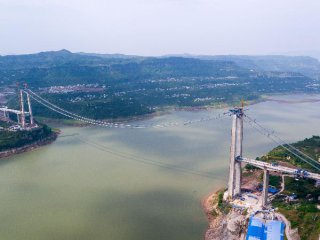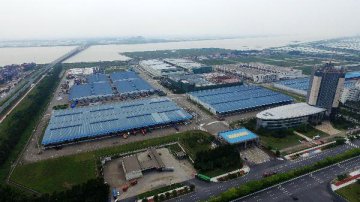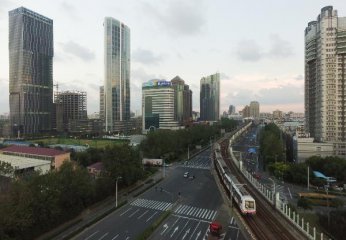
China’s four free trade zones (FTZ) in Shanghai, Guangdong Province, Tianjin and Fujian Province have scored new achievements. Experience from these FTZ pilots is expected to be replicated and promoted in one to two months.
From this January to May, all together 69,177 enterprises had established in the FTZs in Shanghai, Guangdong Province, Tianjin and Fujian Province, including 65,117 domestic enterprises with registered capital of 1,952 billion yuan and 4,060 foreign-capital enterprises with contractual foreign investment of 308.6 billion yuan, Shen Danyang, spokesperson of the Ministry of Commerce (MOFCOM), revealed at the news conference on August 2. “All pilot tasks were rolled out and over 90 percent of the plans were implemented. In particular, the number of foreign-capital enterprises newly set up in the way of filing has reached 4,030, representing 99.3 percent of the total. It means that substantially all the foreign-capital enterprises have adopted filing.”
At the same time, each FTZ has carried out bold explorations in various aspects surrounding acceleration of building new system of open economy, including investment, trade, finance, entrepreneurship and innovation and regulation in process and afterwards. This could effectively activate the vitality of the major market players, vigorously promote massive entrepreneurship and innovation, and form replicable and transferable experience from pilot reforms.
It is said that pilot experience comes from six aspects: 1) continuously deepened reform on investment management system, deepened the pilot of “national treatment plus blacklist” management model before the admission of foreign investment, and expanded trading registration system reform; 2) highlighted trade facilitation. Port management department realized information exchange, mutual recognition on regulation and mutual assistance on law enforcement, and continuously optimized the supervision model of “easing regulations by the central government and safely and effectively strengthening control by local government”. Thanks to this method, the clearance efficiency of each FTZ improved by 40 percent in average; 3) introduced measures for the opening and innovation of financial industry, which has improved the quality and level of services for real economy. For example, the trade account pilot of Shanghai FTZ has expanded from RMB business to foreign currency business, and pilot FTZs in Guangdong Province, Tianjin and Fujian Province have launched credit risk compensation for medium, small and micro-sized enterprises, as well as exemption of loan guarantee for small and micro enterprises with creditability through bank and taxation; 4) built the initial form of the whole chain credit supervision system of “prior integrity and commitment, in process evaluation and classification, and afterwards interconnection, reward and punishment”; 5) built the initial form of public service support system based on encouraging entrepreneurship and innovation; 6) continuously launched differentiated measures aiming at serving national strategies such as the “Belt and Road” initiative.
“Currently, an office under the State Council is working together with other related departments and the four provinces and municipalities to summarize experience and suggestions from the latest pilot reform. And their conclusions will be evaluated by third parties. Once all necessary procedures are performed, the experience could be promoted,” Shen told the journalist. “The experience from pilot reform is expected to be replicated and promoted in one to two months.”
Bai Ming, an official from the Chinese Academy of International Trade and Economic Cooperation, MOFCOM, is in the view that China has to leap forward when transferring from a big trading nation to a trading power. Particularly, more efforts should be made in stabilizing foreign trade, utilizing foreign trade and improving environment for investment. To promote and replicate experience from free trade zones is an important step.
“The replication and promotion should be particularly combined with contents of the G20 Global Trade Growth Strategy and G20 Guiding Principles for Global Investment approved at the G20 trade ministers meeting. Trade facilitation and e-commerce should be the highlights,” said Bai.
As the new round of economic and trade rules are in restructuring, it is urgent for China to build new system of open economy nationwide. The 13th Five-year period will be a critical period for the construction of pilot FTZs.
But the government has obviously taken the first step, as this year’s Government Work Report proposes to expand the pilots FTZs.
As the replication and promotion work of experience from the latest FTZs will soon be unveiled, some media recently reported that the third batch of FTZs will be determined within the second half year. Three months ago, officials from Chongqing, Sichuan Province, Hubei Province, Henan Province, Guangxi Zhuang Autonomous Region and Liaoning Province have participated in the FTZ trading course held in Beijing. Such regions are most likely to appear on the list of the third batch of FTZs.
“The target of building FTZs is not to create regions with preferential policies. The success of FTZ depends on whether its experience can be replicated or promoted or not,” said Wang Jun, deputy head of consulting and research department of China International Center for Economic and Technical Exchange. “Facing the changes of rules of global economy and trade, China should build new system of open economy nationwide. Therefore, the ultimate goal of building FTZ is to promote the experience all across China, and build China into a popular place that can attract foreign investment.”
Translated by Adam Zhang
























Latest comments